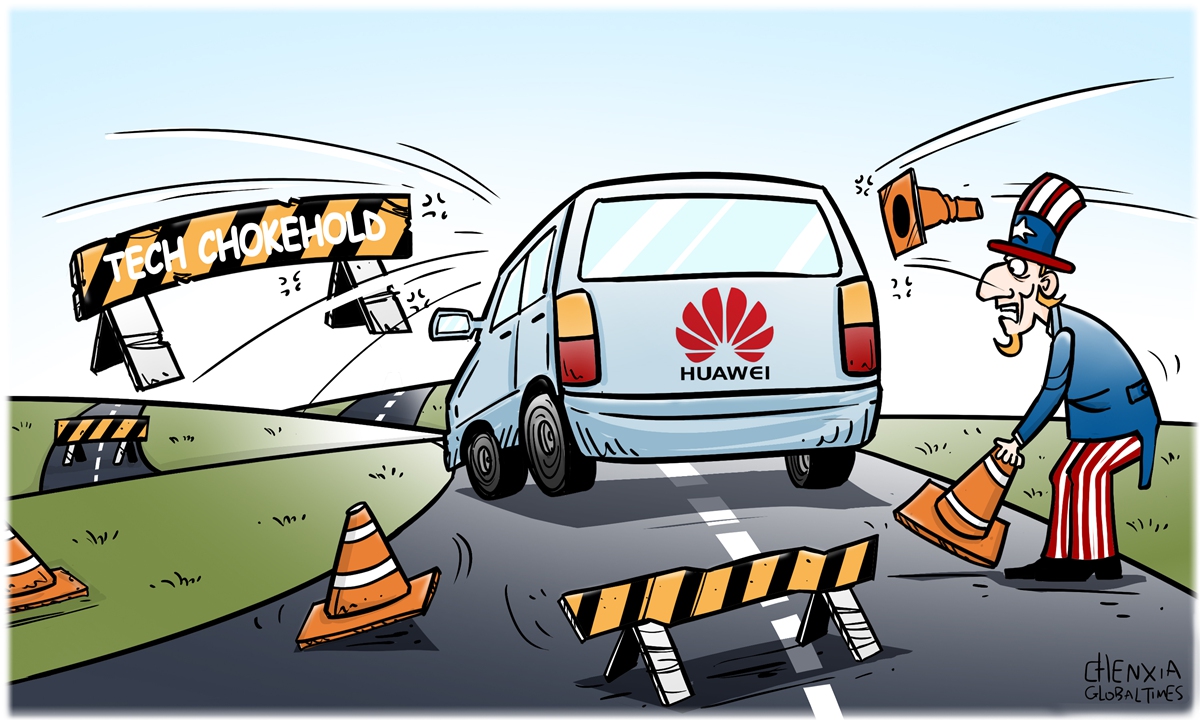
Breaking through barriers. Illustration:Chen Xia/GT
The most significance of the Huawei Mate 60 Pro lies in its ability to bypass the US sanctions wall and open up new horizons. The sanctions imposed by the US on Huawei and Chinese companies may now be extended to companies such as Qualcomm, Nvidia, Intel, TSMC, Samsung, and others. If it is true, as hearsay on the internet suggests, that the Mate 60 Pro does not contain technologies strictly controlled by the US through sanctions, then the Mate 60 Pro represents a turning point. It could potentially lead to a significant reduction in chip profits for American companies and herald the rise of Chinese operating systems.
The Mate 60 Pro is not only a 5G phone but also the world's first mass-market smartphone with satellite calling capabilities.
Analysts predict its global sales could reach tens of millions, and Huawei's annual smartphone sales could reach 40 to 50 million units. The Kirin 9000s chip also opens up the possibility for other Chinese smartphone brands to transition from using Qualcomm chips to adopting domestic chips. Huawei's smartphones will drive the expansion of the HarmonyOS ecosystem, paving the way for the installation of HarmonyOS on other Chinese smartphone brands. Even if other Chinese smartphones continue to use American technology, the negotiating position of those Chinese manufacturers will be different from now on.
All these possibilities are built on a solid foundation, and now is the most difficult time for the US hardliners who advocate for unlimited sanctions against China. They see a huge loophole in sanctioning Huawei and imposing technology bans on China, and what makes them panic is how this loophole was formed. They are confused, like being lost in the fog.
If the US authorities are determined to further tighten sanctions comprehensively, it will be a risky bet that they cannot afford. Not only do they need to expand the scope of sanctions against Chinese companies on a large scale, but they also need to increase the depth of sanctions, demanding that the US and Western companies under its control not sell any semiconductor materials and manufacturing equipment, even low-end ones, to China. However, doing so will immediately harm US and Western companies, and Washington has no guarantee that it can kill the Kirin 9000s chip. If the chip's independence has already gone far beyond the US sanctions wall, it would be futile for the US to build a larger sanctions wall, which will only strangle the US and Western semiconductor industry in a more ruthless and foolish way. The end of such a policy will be the demise of chip giants like Qualcomm.
The Huawei Mate 60 Pro has put immense pressure on the US Department of Commerce's "Entity List." China's manufacturing industry is complete and has accumulated a solid foundation for scientific research and innovation. In this situation, any breakthrough is possible. Washington has severely overestimated its ability to mobilize Western allies to suffocate China's high-tech development and has made a tragic misjudgment.
In fact, Huawei has become the company with the strongest ability to resist sanctions globally and possesses the most critical information industry technologies. Whether it is Qualcomm, Samsung, or TSMC, they are all parts of the US technological hegemony system and would perish without it. However, Huawei is different from them. Huawei has contributed to the infrastructure of 5G networks, and has produced 5G smartphones connected to the BeiDou system while moving beyond the US-dominated supply chain. I hope history will prove that the Huawei Mate 60 Pro heralds the arrival of a new era in technology. It is an era where the US no longer has the ability to overlook the world from a position of dominance and arbitrarily set rules. It will be an era of greater freedom and fairness.
The author is a Chinese media professional. opinion@globaltimes.com.cn



